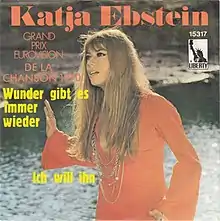Wunder gibt es immer wieder
"Wunder gibt es immer wieder" (English translation: "Miracles Keep Happening Again And Again") was the German entry in the Eurovision Song Contest 1970, performed in German by Katja Ebstein.
 | |
| Eurovision Song Contest 1970 entry | |
| Country | |
| Artist(s) | |
| Language | |
| Composer(s) | Christian Bruhn |
| Lyricist(s) | Günter Loose |
| Conductor | Christian Bruhn |
| Finals performance | |
| Final result | 3rd |
| Final points | 12 |
| Entry chronology | |
| ◄ "Primaballerina" (1969) | |
| "Diese Welt" (1971) ► | |
The song was performed eleventh on the night (following Monaco's Dominique Dussault with "Marlène" and preceding Ireland's Dana with "All Kinds of Everything"). At the close of voting, it had received 12 points, placing 3rd in a field of 12.
The song is a positive one, with a slow yet happy melody reminiscent of Janis Joplin. Ebstein comments that there is no point in complaining that one is unhappy or loveless, because miracles constantly happen and one will eventually happen to everyone. Ebstein also recorded the song in English (as "No More Love for Me"), French ("Un miracle peut arriver"), Spanish ("Siempre hay algún milagro"), Italian ("Nella strada del mio cuore") and Japanese ("Ai no otozure").
It was covered by Guildo Horn and later by Monrose for the Deutscher Vorentscheid 2007.
It was succeeded as German representative at the 1971 Contest by Ebstein again, this time with "Diese Welt". Ebstein returned a third time to the Contest in 1980 with "Theater".
References and external links
| Preceded by "Primaballerina" by Siw Malmkvist |
Germany in the Eurovision Song Contest 1970 |
Succeeded by "Diese Welt" by Katja Ebstein |
